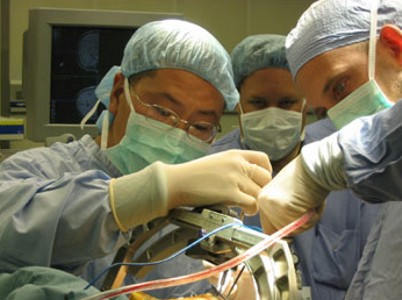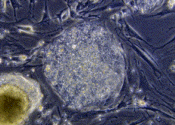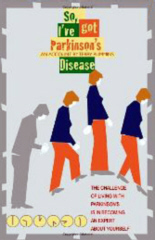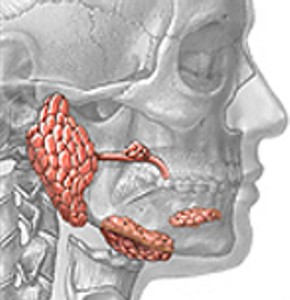 Parkinson's Database are
conducting a survey of the causes of Parkinson's Disease. They believe that the
mass accumulation of data for Physicians and Researchers will provide better
treatments and faster diagnosis. They want to accumulate as
much pertinent data on Parkinson's Disease and related diseases as possible.
They believe that this data needs to come from the patients themselves in order
to paint a much clearer picture of this disease for researchers. They do not
want personal information. They believe that they will receive a much wider and
more honest responses by providing anonymity. http://www.parkinsonsdatabase.net/
Parkinson's Database are
conducting a survey of the causes of Parkinson's Disease. They believe that the
mass accumulation of data for Physicians and Researchers will provide better
treatments and faster diagnosis. They want to accumulate as
much pertinent data on Parkinson's Disease and related diseases as possible.
They believe that this data needs to come from the patients themselves in order
to paint a much clearer picture of this disease for researchers. They do not
want personal information. They believe that they will receive a much wider and
more honest responses by providing anonymity. http://www.parkinsonsdatabase.net/WELCOME TO OUR PARKINSON'S PLACE!
I HAVE PARKINSON'S DISEASES AND THOUGHT IT WOULD BE NICE TO HAVE A PLACE WHERE THE CONTENTS OF UPDATED NEWS IS FOUND IN ONE PLACE. THAT IS WHY I BEGAN THIS BLOG.
I COPY NEWS ARTICLES PERTAINING TO RESEARCH, NEWS AND INFORMATION FOR PARKINSON'S DISEASE, DEMENTIA, THE BRAIN, DEPRESSION AND PARKINSON'S WITH DYSTONIA. I ALSO POST ABOUT FUNDRAISING FOR PARKINSON'S DISEASE AND EVENTS. I TRY TO BE UP-TO-DATE AS POSSIBLE.
I AM NOT RESPONSIBLE FOR IT'S CONTENTS. I AM JUST A COPIER OF INFORMATION SEARCHED ON THE COMPUTER. PLEASE UNDERSTAND THE COPIES ARE JUST THAT, COPIES AND AT TIMES, I AM UNABLE TO ENLARGE THE WORDING OR KEEP IT UNIFORMED AS I WISH. IT IS IMPORTANT TO UNDERSTAND I AM A PERSON WITH PARKINSON'S DISEASE. I HAVE NO MEDICAL EDUCATION,
I JUST WANT TO SHARE WITH YOU WHAT I READ ON THE INTERNET. IT IS UP TO YOU TO DECIDE WHETHER TO READ IT AND TALK IT OVER WITH YOUR DOCTOR. I AM JUST THE COPIER OF DOCUMENTS FROM THE COMPUTER. I DO NOT HAVE PROOF OF FACT OR FICTION OF THE ARTICLE. I ALSO TRY TO PLACE A LINK AT THE BOTTOM OF EACH ARTICLE TO SHOW WHERE I RECEIVED THE INFORMATION SO THAT YOU MAY WANT TO VISIT THEIR SITE.
THIS IS FOR YOU TO READ AND TO ALWAYS KEEP AN OPEN MIND.
PLEASE DISCUSS THIS WITH YOUR DOCTOR, SHOULD YOU HAVE ANY QUESTIONS, OR CONCERNS. NEVER DO ANYTHING WITHOUT TALKING TO YOUR DOCTOR FIRST..
I DO NOT MAKE ANY MONEY FROM THIS WEBSITE. I VOLUNTEER MY TIME TO HELP ALL OF US TO BE INFORMED.
I WILL NOT ACCEPT ANY ADVERTISEMENT OR HEALING POWERS, HEALING FROM HERBS AND ETC. UNLESS IT HAS GONE THROUGH TRIALS AND APPROVED BY FDA. IT WILL GO INTO SPAM.
THIS IS A FREE SITE FOR ALL WITH NO ADVERTISEMENTS
THANK YOU FOR VISITING! TOGETHER WE CAN MAKE A DIFFERENCE!
TRANSLATE
Wednesday, March 20, 2013
SURVEY OF THE CAUSES OF PARKINSON'S DISEASE
 Parkinson's Database are
conducting a survey of the causes of Parkinson's Disease. They believe that the
mass accumulation of data for Physicians and Researchers will provide better
treatments and faster diagnosis. They want to accumulate as
much pertinent data on Parkinson's Disease and related diseases as possible.
They believe that this data needs to come from the patients themselves in order
to paint a much clearer picture of this disease for researchers. They do not
want personal information. They believe that they will receive a much wider and
more honest responses by providing anonymity. http://www.parkinsonsdatabase.net/
Parkinson's Database are
conducting a survey of the causes of Parkinson's Disease. They believe that the
mass accumulation of data for Physicians and Researchers will provide better
treatments and faster diagnosis. They want to accumulate as
much pertinent data on Parkinson's Disease and related diseases as possible.
They believe that this data needs to come from the patients themselves in order
to paint a much clearer picture of this disease for researchers. They do not
want personal information. They believe that they will receive a much wider and
more honest responses by providing anonymity. http://www.parkinsonsdatabase.net/COGANE FAILS CLINICAL TRIALS FOR PARKINSON'S DISEASE
 Cogane, which
can be taken orally, readily crosses the blood-brain barrier and has been shown
to stimulate the release of GDNF. GDNF can indirectly stimulate the formation of
dopamine, the substance whose insufficiency causes Parkinson's Disease.
However, GDNF deficiency has never been shown to be the cause of Parkinson's
Disease. Previous studies claiming efficacy for Cogane in Parkinson's Disease
were only carried out in Macaque monkeys who did not actually have Parkinson's
Disease.
Cogane, which
can be taken orally, readily crosses the blood-brain barrier and has been shown
to stimulate the release of GDNF. GDNF can indirectly stimulate the formation of
dopamine, the substance whose insufficiency causes Parkinson's Disease.
However, GDNF deficiency has never been shown to be the cause of Parkinson's
Disease. Previous studies claiming efficacy for Cogane in Parkinson's Disease
were only carried out in Macaque monkeys who did not actually have Parkinson's
Disease.DBS IS EFFECTIVE IN EARLIER PARKINSON'S DISEASE
 Researchers assessed
whether it would be suitable to use Subthalamic stimulation at an earlier stage
of Parkinson's Disease. Subthalamic stimulation, which is referred to as DBS
(Deep Brain Stimulation), involves the use of
electrodes that are implanted into the brain and connected to a small electrical
device called a pulse generator that can be externally programmed. DBS can
reduce the need for L-dopa and related drugs, which in turn decreases the
involuntary movements called dyskinesias that are a common side effect of
L-dopa.
Researchers assessed
whether it would be suitable to use Subthalamic stimulation at an earlier stage
of Parkinson's Disease. Subthalamic stimulation, which is referred to as DBS
(Deep Brain Stimulation), involves the use of
electrodes that are implanted into the brain and connected to a small electrical
device called a pulse generator that can be externally programmed. DBS can
reduce the need for L-dopa and related drugs, which in turn decreases the
involuntary movements called dyskinesias that are a common side effect of
L-dopa. MOLECULAR HYDROGEN WATER FOR PARKINSON'S DISEASE
Movement Disorders [2013] Feb 11 (A.Yoritaka, M.Takanashi, M.Hirayama, T.Nakahara, S.Ohta, N.Hattori, D.Weintraub, K.Papay, A.Siderowf)
 Drinking molecular hydrogen
dissolved water had reduced oxidative stress and improved Parkinson's Disease
features in animals. A pilot study was carried out in people with Parkinson's
Disease who were taking L-dopa. Each person drank either a litre a day of
molecular hydrogen water or only water (without the molecular hydrogen). Symptom
scores improved in those people who drank molecular hydrogen water and worsened
in those people who only drank normal water. The drinking of molecular hydrogen
water was found to safe and well tolerated. It would therefore be an easy means of delaying or
reducing symptoms. A larger clinical trial is intended.
Drinking molecular hydrogen
dissolved water had reduced oxidative stress and improved Parkinson's Disease
features in animals. A pilot study was carried out in people with Parkinson's
Disease who were taking L-dopa. Each person drank either a litre a day of
molecular hydrogen water or only water (without the molecular hydrogen). Symptom
scores improved in those people who drank molecular hydrogen water and worsened
in those people who only drank normal water. The drinking of molecular hydrogen
water was found to safe and well tolerated. It would therefore be an easy means of delaying or
reducing symptoms. A larger clinical trial is intended. POSITIVE RESULTS CLAIMED FOR STEM CELLS IN PARKINSON'S DISEASE
International Stem Cell Corporation have claimed positive results from its pre-clinical study using stem cells in the treatment of Parkinson's Disease. The primary goal of the study was to demonstrate the benefits of neuronal cells derived from human stem cells. The neuronal cells were derived from human parthenogenetic stem cells, which are not obtained via reproduction. They can become neurons when they are implanted in to the brain.
 The study was carried out for
12 weeks on rats who did not actually have Parkinson's Disease. The rats were
instead given 6-OHDA (6-Hydroxydopamine), which is a toxin used to kill
dopaminergic neurons (the cells involved in Parkinson's Disease). The actual
results for the study have not been disclosed. It has only been stated that
"signs of improvement in rotational behavior of these animals were clearly
observed.
The study was carried out for
12 weeks on rats who did not actually have Parkinson's Disease. The rats were
instead given 6-OHDA (6-Hydroxydopamine), which is a toxin used to kill
dopaminergic neurons (the cells involved in Parkinson's Disease). The actual
results for the study have not been disclosed. It has only been stated that
"signs of improvement in rotational behavior of these animals were clearly
observed. SO I'VE GOT PARKINSON'S DISEASE
Terry Rummins
 Publisher's description
: Terry Rummins was diagnosed with Parkinson's 10 years ago. So, I've Got
Parkinson's Disease is her story and covers her diagnosis and the progression of
the condition - from the first warning tremors in her right hand to her
day-to-day life now. Terry has written this book in the hope that describing her
experience will benefit others who have been diagnosed with Parkinson's and to
help them understand their expectations of how the condition may affect them.
This is a candid story, told with humour and contains a positive message for
those recently diagnosed and those close to them. It is also for anyone
interested in what happens when life presents an unpleasant surprise.
Publisher's description
: Terry Rummins was diagnosed with Parkinson's 10 years ago. So, I've Got
Parkinson's Disease is her story and covers her diagnosis and the progression of
the condition - from the first warning tremors in her right hand to her
day-to-day life now. Terry has written this book in the hope that describing her
experience will benefit others who have been diagnosed with Parkinson's and to
help them understand their expectations of how the condition may affect them.
This is a candid story, told with humour and contains a positive message for
those recently diagnosed and those close to them. It is also for anyone
interested in what happens when life presents an unpleasant surprise.
USING CELL PHONES TO MONITOR PARKINSON'S DISEASE
IEEE Transactions on Biomedical Engineering (submitted) [2013] (A.Tsanas, M.A.Little, P.E.McSharry, L.O. Ramig)
 Telephone monitoring of Parkinson’s Disease has attracted
interest as a potential means of assessing this. Purpose built devices have been
developed that record various signals that can be associated with symptom
severity, as quantified on standard Parkinson's Disease scores such as the
Unified Parkinson’s Disease Rating Scale (UPDRS). Previous studies have
demonstrated replication of UPDRS scores to within less than 2 points of a
clinical raters’ assessment of symptom severity, using solely high-quality
speech signals.
Telephone monitoring of Parkinson’s Disease has attracted
interest as a potential means of assessing this. Purpose built devices have been
developed that record various signals that can be associated with symptom
severity, as quantified on standard Parkinson's Disease scores such as the
Unified Parkinson’s Disease Rating Scale (UPDRS). Previous studies have
demonstrated replication of UPDRS scores to within less than 2 points of a
clinical raters’ assessment of symptom severity, using solely high-quality
speech signals. SALIVA GLAND TEST FOR PARKINSON'S DISEASE
 The study involved 15
people with an average age of 68 who had Parkinson's disease for an average of
12 years, who responded to Parkinson's medication and who did not have known
saliva gland disorders. Biopsies were taken of two different saliva glands. The
abnormal Parkinson's protein was detected in nine of the 11 patients who had
enough tissue to study. This is the first study demonstrating the value of
testing a portion of the saliva gland to diagnose a living person with
Parkinson's Disease.
The study involved 15
people with an average age of 68 who had Parkinson's disease for an average of
12 years, who responded to Parkinson's medication and who did not have known
saliva gland disorders. Biopsies were taken of two different saliva glands. The
abnormal Parkinson's protein was detected in nine of the 11 patients who had
enough tissue to study. This is the first study demonstrating the value of
testing a portion of the saliva gland to diagnose a living person with
Parkinson's Disease. PARKINSON'S DISEASE DOES NOT CAUSE COMPULSIONS
Neurology [2013] 80 (2) : 176-180 (Weintraub D, Papay K, Siderowf A)
